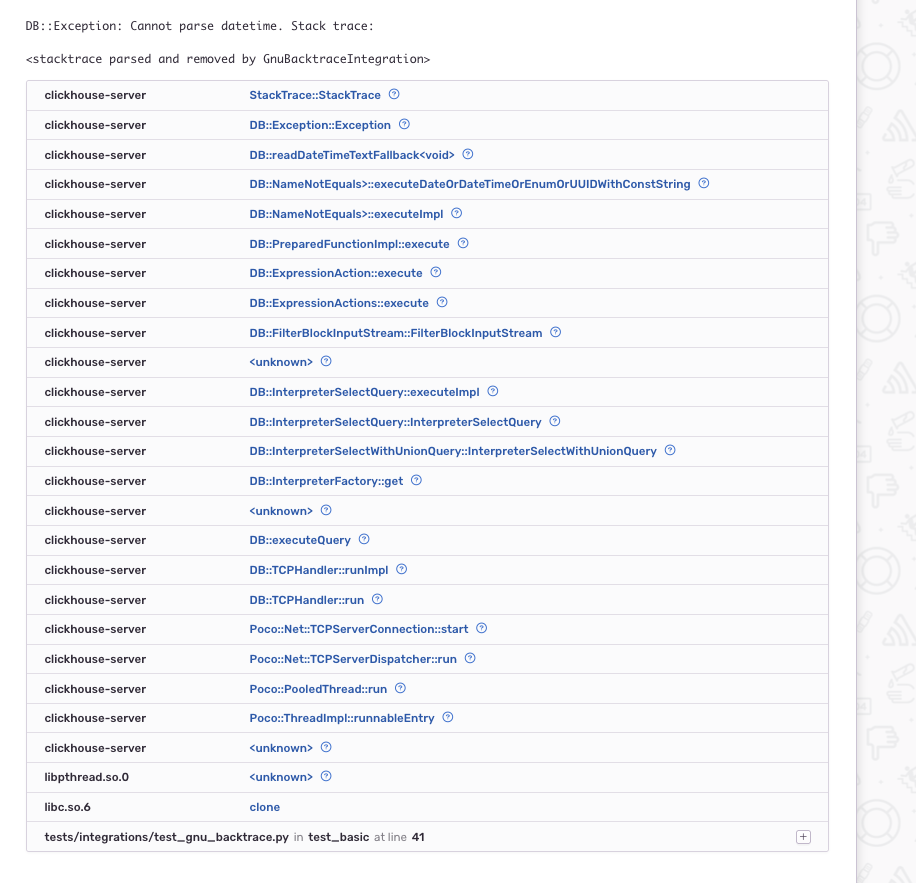-
Notifications
You must be signed in to change notification settings - Fork 557
feat: Add integration for parsing GNU-style backtrace dumps #288
New issue
Have a question about this project? Sign up for a free GitHub account to open an issue and contact its maintainers and the community.
By clicking “Sign up for GitHub”, you agree to our terms of service and privacy statement. We’ll occasionally send you account related emails.
Already on GitHub? Sign in to your account
Conversation
|
I wonder if we can share this code across SDKs somehow. There's nothing in this integration that couldn't apply to nodejs or C#. I considered writing it in Haxe. |
|
@bruno-garcia adding you because of what we discussed the last retros about SDK work. |
|
@untitaker do you have a screenshot of what it looks like in Sentry the mix callstack? If you do, could you paste in the PR, please? |
|
@mitsuhiko reminded me to set platform to native, will fix |
|
@untitaker we ahve new stacktrace rendering now? :) |
|
@bruno-garcia I updated the screenshot |
|
One shitty aspect of this right now is that every frame is annotated as inline frame because there are no instruction addrs |
|
@untitaker We can change that quite easily. Should actually. |
There was a problem hiding this comment.
Choose a reason for hiding this comment
The reason will be displayed to describe this comment to others. Learn more.
OK with changing the instruction addr this (wrt inline frame) on a separate PR.
This integration was added back in 2019 #288 but I think since then the stack trace from clickhouse driver has changed, anyway I tried to update it so that it parses the stack trace again

Value proposition: ClickHouse sends us error messages with stacktrace information. Ideally we would parse this stacktrace information into actual stacktraces. Here is an integration for exactly that. The testcase is ripped straight from https://sentry.io/organizations/sentry/issues/856036064
ClickHouse calls
backtrace_symbols. It already returns a formatted string/list of strings. ClickHouse then parses this string and replaces symbols with demangled versions. I didn't bother with parsing addresses and offsets as I don't see much value in that information (not sure if it's used in grouping) and some of those return addresses (brackets at the end) seem wrong:I'm open to alternative naming suggestions. As far as I can tell this function has its origins in glibc.
LibExecInfoBacktraceIntegrationseemed bulky. PerhapsGlibcBacktraceIntegrationto avoid conflict with GDB's output format, which seems entirely different? I'm generally unsure ofbacktrace_symbols's origin. It seems to have started as a glibc thing but there are ports for BSD and Darwin. It isn't POSIX though.When discussing the idea of this with @mitsuhiko there was the idea to have a single
NativeStacktraceIntegrationwhere we would add new kinds of stacktrace formats over time. However, in order to not break grouping between minor versions, we can't actually add new variants to that "super-integration" without having the user explicitly opt into each of them (just the same reason why we can't make this a default integration). Therefore I see no point in having one integration for multiple formats, and the naming problem persists.cc @alex-hofsteede